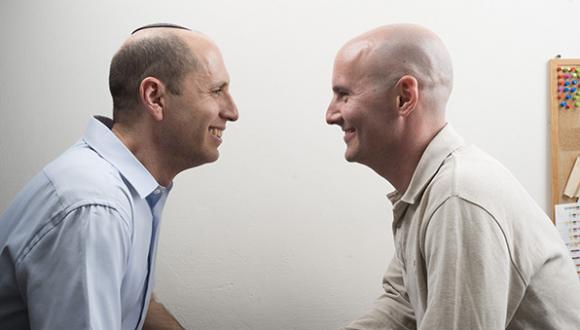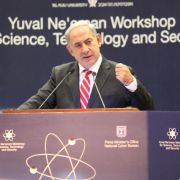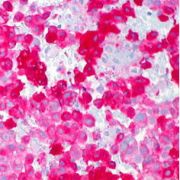A Tale of Two Recruits
When Drs. Ariel Munitz, 39, and Udi Qimron, 39, joined the Department of Clinical Microbiology and Immunology at TAU’s Sackler Faculty of Medicine on the same day in 2009, they were pleasantly surprised to discover they had known one another at Yeshiva High School (Netiv Meir) in Jerusalem. Fresh off the plane from post-doctoral studies in the United States – Ariel from the Cincinnati Children’s Hospital and Udi from Harvard – they were excited to be taking up research positions at their university of choice and to resume their friendship in the process.
Four years later, Ariel and Udi have impressive research accomplishments under their belts and are considered trailblazers in their fields. Both have published in the world’s most prestigious scientific journals – Ariel in Nature Immunology and Udi in PNAS (Proceedings of the National Academy of Sciences). Both have made breakthroughs that could pave the way for new, life-saving medical therapies. Both men knew they wanted to return to Israel for their academic careers and chose Tel Aviv University over other Israeli research institutions: “The medical faculty here is flourishing and we wanted to be part of this vibrant research community,” says Ariel. “There’s a real emphasis here on academic freedom,” says Udi. “Right from the outset we were given complete independence. This allowed us to pursue creative research directions and encouraged us to grapple with tough scientific problems.” “Of course, there are academic commitments and regulations here, but no one’s telling you that in order to achieve a certain goal, you should do this or that,” adds Ariel. “The type of autonomy they allow us here fosters independent and creative thinking.”
Since joining TAU, the two have become close friends – both on and off the campus. With offices on the same high floor of the Sackler School of Medicine building, they eat lunch together every day while enjoying the view out over Tel Aviv and discussing their lives, research and future goals.
“Positive competition”
Quoting from an old Talmudic saying, “when writers vie, wisdom mounts,” Ariel and Udi say that the positive competition between them spurs them on to greater results. “We’re not in direct competition; I’m focused on immunology research and Udi on microbiology,” says Ariel, “but if one of us gets a study published then it’s an incentive for the other.”
Udi was one of 16 TAU researchers to win prestigious European Council Research (ERC) grants over the last year. “The 1.5 million euro grant will help me determine my research path for the next five to ten years,” says Udi. “It will generate spin-off projects from my current research.” Ariel’s research is supported by the Fritz Thyssen Foundation, the Israel Science Fund, Israel Cancer Research Fund and the Binational Science Foundation. “Now that Udi’s got an ERC grant, I want one too,” he says amiably. The relationship between the two extends beyond competition and camaraderie, however, as they delve into one another’s research and exchange valuable ideas and insights.
Wrangling the immune system
Ariel and his team have developed a new method for treating chronic inflammatory diseases. “The immune system is a double-edged sword,” says Ariel. “While its primary role is to fight infections, it can also become overactive, leading to problems like asthma and autoimmune diseases.” Ariel and his team have discovered a powerful mechanism that keeps the inflammatory cells from going rogue – a breakthrough that could lead to effective treatments for asthma, blood disorders and cancer. “I’m combining the expertise I gained in my PhD studies in pharmacology together with my post-doc research in immunology,” says Ariel. “By identifying the inhibitory mechanisms that restrain inflammatory cells, I can potentially harness them in fighting disease,” says Ariel.
A substitute for antibiotics
Tackling a different problem – that of bacterial resistance to antibiotics – Udi uses viruses to kill pathogenic bacteria. He and his team have succeeded in isolating a viral protein that prevents bacteria from dividing, thereby destroying them and combating infections. The discovery is currently being patented and could lead to the development of a novel type of antibiotic. While both scientists are developing game-changing concepts, the two admit that they think in entirely different ways. “The immune system Ariel deals with is extremely complex,” says Udi. “In contrast, I target the simplest systems in nature such as the virus I’m working on.” Ariel jokes, “That’s why it takes me three years to publish, while Udi can publish three papers in the same time frame.”
After two years at TAU, the two accidentally discovered that they had crossed paths in another episode in their lives. “One day, Udi told me he had had a strange dream,” relates Ariel. “He dreamt that he was on an officer’s course in the army during a combat exercise and had to treat a soldier whose hand had been severly injured. ‘Udi,’ I said, ‘that wasn’t a dream! I was the trainee officer who got wounded and you were the medic,’” Ariel told him. “I guess our lives were meant to overlap in many ways,” says Udi.






